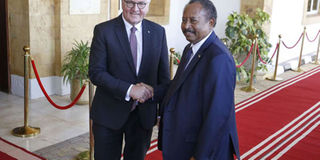Steinmeier’s visit to Khartoum boosts Sudan bid against isolation

Sudanese Prime Minister Abdalla Hamdok (right) receives German President Frank-Walter Steinmeier ahead of their joint press conference in Khartoum on February 27, 2020. -PHOTO | ASHRAF SHAZLY | AFP
What you need to know:
- Mr Steinmeier became the first German President to visit Khartoum since 1985, and is the highest ranking global leader to visit Sudan since the ouster of Omar al-Bashir last April.
- His public support for Sudan’s bid to attract investors, by getting off the sanctions list, could help.
- President Steinmeier acknowledged challenges facing Sudan and Germany but said that there is encouragement for the next steps.
Khartoum,
German President Frank-Walter Steinmeier’s visit to Khartoum this week has become the latest marketing tool for the transitional government to help Sudan out of international isolation.
Mr Steinmeier became the first German President to visit Khartoum since 1985, and is the highest ranking global leader to visit Sudan since the ouster of Omar al-Bashir last April.
His two-day trip from Thursday has left authorities excited it could further lift the image of a country still struggling to get off United States sanctions list.
INVESTORS
In Khartoum, the German leader met Abdul Fattah Al-Burhan, leader of the Transitional Sovereign Council, as well as Prime Minister Abdalla Hamdok.
His public support for Sudan’s bid to attract investors, by getting off the sanctions list, could help.
“I am here to say that we are happy with the changes in Sudan and public is interested in that as well," he said.
"The Sudanese people should be proud to overthrow a regime that has suffered so much."
CHALLENGES
President Steinmeier acknowledged challenges facing Sudan and Germany but said that there is encouragement for the next steps.
“We know the difficult economic situation and that Sudan needs access to international financial institutions,” Mr Steinmeier told a joint press conference with Premier Hamdok on Thursday.
“I assured Hamdok that Germany can be relied on and pointed out the economic potentials and that work is ongoing to improve the situation permanently. Germany is ready to support the peace process in the future.”
TERRORISM
The German leader had visited Burkina Faso and Kenya, vowing support for development and trade, as well as international cooperation to defend what he called multilateralism: cooperation through international bodies.
Germany, for example, has announced that it will increase its contribution towards fighting locust invasion in East Africa, providing an additional $18.7 million to the UN Food and Agricultural Organisation, making its total commitment $21.99 million.
But in Sudan, where food shortage and hard economic times have been felt just as much, the problem is the restriction to international assistance.
Officially, the US lists Sudan as a state sponsor of terrorism and a USA court has issued a verdict demanding that Khartoum pays families of victims of a US warship bombed in a Yemen port in 2001.
The terror merchants of that incident were reportedly trained in Sudan, where then al-Qaeda mastermind Osama bin Laden had stayed in the 80s.
The German leader argued it should be fair for a transitional government to continue paying for the illegal acts of the past regimes.
OTHER SUPPORT
Germany had sent in its Foreign Minister when Hadmok was sworn in last year.
This visit indicated thawing relations with Germany itself, which had been in a lull for three decades of Bashir’s rule.
Steinmeier’s talks with al-Burhan, dealt with the joint relations between the two countries and ways to support and enhance them, in addition to the role that Germany can play in supporting Sudan economically and politically.
Al-Burhan said the discussions focused “on issues of mutual interest, future cooperation and the required German support".
In the joint press conference after the joint talks session in the Cabinet, Hamdok said Berlin's decision to lift the development ban on Sudan establishes strong ties.
But he added, “We aspire to more cooperation and there are many areas including energy, electricity, mining, education, media. These are areas that allow joint action.”
Reporting by Mawahib Abdallatif, Nation's Correspondent in Khartoum, Sudan.




